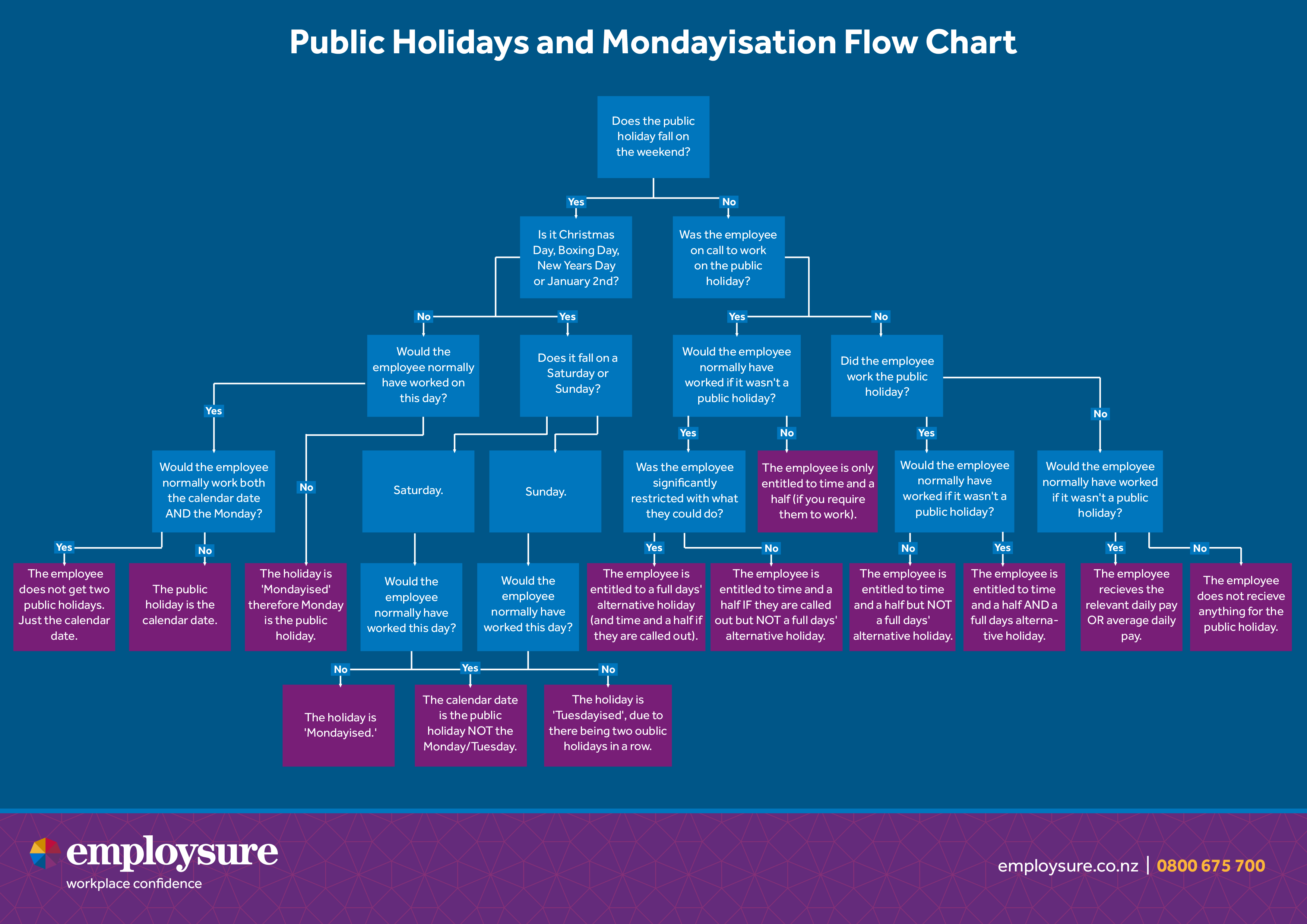
Public holidays
Employers across New Zealand are required to recognise the 11 public holidays provided for in the Holidays Act 2003. These 11 days every year can cause confusion for employers when it comes to public holiday pay. The most important message for owners of any business is that regardless of the type of employment, whether it is full-time, part time, or casual, your employees are entitled to any benefits that come from working on public holidays.
Public Holidays 2024
| Holiday | Actual Date | Observed Date |
| New Year’s Day | 1 January | Monday 1 January |
| Day after New Year’s Day | 2 January | Tuesday 2 January |
| Waitangi Day | 6 February | Tuesday 6 February |
| Good Friday | Varies | Friday 29 March |
| Easter Monday | Varies | Monday 1 April |
| ANZAC Day | 25 April | Thursday 25 April |
| King’s Birthday | 1st Monday in June | Monday 3 June |
| Matariki | Varies | Friday 28 June |
| Labour Day | 4th Monday in October | Monday 28 October |
| Christmas Day | 25 December | Wednesday 25 December |
| Boxing Day | 26 December | Thursday 26 December |
List of Public Holidays in 2024
Working on public holidays
When a public holiday falls on a day an employee would typically work, they are entitled to a day off. However, an employee can be made to work if the public holiday is observed on a day the employee would typically work and their employment agreement says they have to work on the public holiday. If the employee is made to work there is a public holiday rate of pay which is time and a half and the employee will also get another paid day off later, otherwise known as a day in lieu. If an employee works a public holiday which is not a usual day they would work, the employee is entitled to time and a half.
There is an added dimension to working on public holidays which can be best illustrated in the case of Easter and when employees work over this period. The public holidays for Easter are Good Friday and Easter Monday, meaning normal public holiday entitlements apply. However, if an employee works on Good Friday but does not normally work on Friday, they are entitled to be paid time and a half but will not get a paid day off later. Easter Sunday is different again as it is not a public holiday itself, so if your employee works they are entitled to the usual rate of pay. If the employee does not work on Easter Sunday they are not entitled to a paid day, unless the employment agreement stipulates something else.
Public holidays on a weekend
Where public holidays are attached to specific dates, rather than days like the Queen’s birthday which is always on a Monday, there can be confusion about the correct way to observe the public holiday, especially when it comes to determining things like public holiday pay with public holidays on a Saturday or Sunday.
Observing a public holiday on a Monday occurs only when the employee does not work on the calendar date of the holiday. In other words, if an employee would ordinarily work on the actual day of the public holiday, whether a Saturday or Sunday, then there is no Mondayisation for this employee and the public holiday benefits only apply to the actual date. Ultimately, an employee will not get two public holidays for the same occasion.
How to calculate Mondayisation
Click the image below to open our flowchart on how to calculate Mondayisation, or you can download the flowchart here.

Public holidays during leave
An important scenario can often present itself where a public holiday falls during a period of leave for an employee. In this scenario, both the type of leave and the type of holiday need to be taken into account.
During a business close-down period that includes public holidays, which is often the case over the Christmas and New Year period, employees are entitled to a paid public holiday only if they would ordinarily work on the day of the public holiday. This is also the case in instances of annual leave, as employees are only entitled to public holiday pay if they would normally work on the day of the public holiday, meaning they will not lose a day of annual leave.
However, where a public holiday falls and an employee is on parental leave they will not be entitled to public holiday pay as they would not have normally worked that day. Also, when on parental leave the payment amount and the number of weeks of leave are not impacted by a public holiday falling within this leave period.
In the case of sick or bereavement leave, if an employee would have worked had they not been on leave, the day is considered a paid unworked public holiday. In which case the employee is paid a standard daily rate of pay and is not entitled to an alternative holiday, but no sick or bereavement leave is deducted either.
Alternative holidays
Commonly referred to as a day off in lieu or a lieu day, alternative holidays are days off at another time given to employees if they work on a public holiday. To be eligible the employee has to work on a public holiday that would normally be a working day for them. Working on a public holiday, in this case, extends to those on call, those working only part of a shift or being on call. There are some restrictions around alternative holidays, meaning an employee can take the alternative holiday:
• on a mutually agreeable date
• on another day on which they would normally be working
• the day cannot be a public holiday
• for a whole working day, regardless of how much of the public holiday they actually worked
If an alternative day cannot be found the employer is entitled to choose a day, provided it is reasonable, and give the employee 14 days’ notice. Also, provided no employment agreement is in place with any other stipulation around payment of alternative holidays, an employee is paid their relevant daily pay for the day taken as an alternative holiday.
An employee who ceases employment, or whose employment is terminated, is entitled to be paid out any alternative days they have not utilised by the time they conclude their employment. Alternative holidays can also be paid out if the employee doesn’t take the day within 12 months of it being earned. In this instance the payment must be agreed by both the employer and the employee and the payment is to be made as soon as practicable after the agreement has been finalised.
Dates for public holidays in New Zealand
Every employee is entitled to 12 public holidays over the course of the year. The 12 days refer to the 11 fixed dates which are common right across the country, with one additional day being the Anniversary Day of the province in which the employee is based. The 11 fixed days are:
Anniversary days
Depending on where an employee is based, the local Anniversary day applies with all the entitlements of a public holiday. Anniversary days are generally observed in their respective province on the Monday closest to their official date, however this does vary. The actual dates of Anniversary days in each province are:
• Auckland – 29 January
• Taranaki – 31 March
• Hawke’s Bay – 1 November
• Wellington – 22 January
• Marlborough – 1 November
• Nelson – 1 February
• Canterbury – 16 December
• Canterbury (south) – 16 December
• Westland – 1 December
• Otago – 23 March
• Southland – 17 January
• Chatham Islands – 30 November
Anniversary day exceptions
While there are official dates of each Anniversary Day, employers should be careful when determining employee public holiday pay rates, ensuring they recognise only the date this anniversary is to be observed. For example, while some Anniversary days are simply observed on the closest Monday, the following exceptions apply:
Taranaki Anniversary is observed on the second Monday in March to not clash with Easter.
Hawke’s Bay Anniversary has been moved to the Friday before Labour Day.
Marlborough Anniversary Day is observed on the Monday after Labour Day.
Canterbury Anniversary is split into two days depending on where in the province the employee is based. Northern and Central Canterbury observe their Anniversary Day on the second Friday after the first Tuesday in November whereas South Canterbury observes the fourth Monday in September.
Otago Anniversary day is perhaps the most complex of Anniversary days with no single day of observance.
Southland Anniversary day is celebrated on Easter Tuesday following an agreement reached between the three southern Mayors in 2011.
Employers and employees are encouraged to rely on the employment agreement or regular custom or practice. Where no provision in the employment agreement exists, a mutually agreeable date should be determined.
For peace of mind around managing your employees on public holidays call 0800 568 012 for advice and support.
Frequently Asked Questions
What is a stat holiday?
Public Holidays are also known as statutory holidays (stat holidays) in New Zealand.
When does an employee qualify for statutory holiday pay?
Employees get a paid day off on public holidays if it’s an otherwise working day for them. An otherwise working day is a day that an employee would have been working had the day not been a public holiday.
Which public holidays are compulsory to be granted to employees?
As well as their four weeks of annual leave, employees are entitled to 12 public holidays each year (if the public holidays fall on days they’d normally work).


